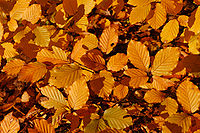ᄀᆞ슬
Appearance
Jeju
[edit]

Etymology
[edit]From Old Korean 秋察 (*KOsol(h), *KOcol(h)). This reflex preserves the /s/ as found in the Old Korean form and southern Modern Korean dialects, compared to its doublet ᄀᆞ을 (gaweul), which was borrowed directly from Early Modern Korean.[1] Cognate with Korean 가을 (ga'eul).
Perhaps related to ᄀᆞᆺ다 (gawtda, “to cut”) & ᄀᆞ새 (gawsae, “scissors”).
Pronunciation
[edit]| Romanizations | |
|---|---|
| Revised Romanization? | gawseul |
| Revised Romanization (translit.)? | gawseul |
| Yale Romanization? | kosul |
Noun
[edit]ᄀᆞ슬 (gawseul)
- autumn; fall
- Synonym: ᄀᆞ을 (gaweul)
- 1994 January 20 [1958 December 17], 秦聖麒, quoting 오창호 (사귀읍 서호리) [ochangho (sagwieup seohori)], “제4편 역사적 옛말 [je4pyeon yeoksajeok yenmal, Part 4: Historical sayings]”, in 濟州島民譚: 濟州島 사투리와 옛말 [Jeju Folktales: Jeju dialects and old sayings], 濟州市 三陽三洞: 제주민속연구소 [jejuminsogyeon'guso], →OCLC, 막선이 [makseoni], page 304:
- ᄒᆞ로은 ᄀᆞ슬히 뒷밭디 조를 비여 놨는디 똑 비가 오람직 ᄒᆞ연 더럭칫 밸감이 "예. 막선아?똑 비가 오람직 ᄒᆞ다" "조 묶으카마씀?"
- [ᄒᆞ로은 ᄀᆞ슬히 뒷밧디 조를 비어 놧는디 똑 비가 오람직 ᄒᆞ연 더럭칫 벨감이 "예. 막선아? 똑 비가 오람직 ᄒᆞ다" "조 묶으카마씀?"]
- Hawro-eun gawseul-hi dwitbatdi jo-reul bieo nwanneundi ttok bi-ga oramjik hawyeon deoreokchit belgam-i Ye. Makseon-a? ttok bi-ga oramjik hawda Jo mukkeuka-masseum?"
- One day in autumn, the foxtail millets were mowed in the back field, and it seemed like it would rain so the official [said]: "Yes, Makson? It surely seems like it's about to rain. Shall we tie up the foxtail millets?"
- 2016 September 30, “아아 으악새 슬피우니 [aa euaksae seulpiuni]”, in 양전형의 제주어로 읽는 세상사 18 [yangjeonhyeong'ui jejueoro ingneun sesangsa 18][2], 제주어보전회 [jejueobojeonhoe], 윤동주의 詩 『나 인생에 ᄀᆞ을이 오민』 중 중략한 일부:
- 나 인생에 ᄀᆞ슬이 들민 나는 나신디, 사름덜을 ᄉᆞ랑헤시냐 들을 거우다.
나는 게베운 ᄆᆞ음으로 ᄀᆞᆯ을 수 싯게, 나는 지금 사름덜을 하영 ᄉᆞ랑ᄒᆞ쿠다.- Na insaeng-e gawseur-i deulmin na-neun na-sindi, sareum-deor-eul sawranghesinya deureul geouda.
na-neun gebe'un maweum-euro gawreul su sitge, na-neun jigeum sareum-deor-eul hayeong sawranghawkuda. - When autumn comes into my life, I ask myself if I've ever loved people.
For me to answer light-heartedly then, I will love more people now.
- Na insaeng-e gawseur-i deulmin na-neun na-sindi, sareum-deor-eul sawranghesinya deureul geouda.
- 2018 November 2, 양창용 [yangchang'yong], “미깡 익어져가민 제주 ᄀᆞ슬도 지퍼지는 거라 양!! [mikkang igeojeogamin jeju gawseuldo jipeojineun geora yang!!]”, in 제주어의 세상여행 54. 귤 [jejueoui sesang'yeohaeng 54. gyul][3], 제민일보 [jeminilbo]:
- 요세, 제주섬에 미깡이 곱들락ᄒᆞ게 잘 익어 가ᇝ이메 베껫드레 나상 ᄀᆞ슬 ᄆᆞ까지기 전의 하영 베려봅서 양?
- yose, jejuseom-e mikkang-i gopdeullakhawge jal igeo gamsime bekket-deure nasang gawseul mawkkajigi jeon-ui hayeong beryeobopseo yang?
- Now, since tangerines on Jeju Island are ripening beautifully, how about going outside to take a look before autumn is over?
- 2021, 강영봉 [gang'yeongbong], 김순자 [gimsunja], “100: ᄀᆞ실 [100: gawsil]”, in 제주어 기초어휘 활용 사전 [jejueo gicho'eohwi hwaryong sajeon, A Dictionary of Basic Jeju Vocabulary], 한그루 [han'geuru], pages 366-367:
Alternative forms
[edit]- ᄀᆞ실 (gawsil)
Derived terms
[edit]- ᄀᆞ슬 ᄂᆞᆷ삐 거죽 두터우민 저슬에 춥나 (gawseul nawmppi geojuk duteoumin jeoseure chumna, “Heavy fall radish skins lead to a cold winter”)
- ᄀᆞ슬ᄑᆞ름 (gawseulpawreum, “fall breeze”)
- ᄀᆞ슬ᄒᆞ다 (gawseulhawda, “harvesting crops such as wheat and barley”)
- ᄀᆞ슬갈치 (gawseulgalchi, “autumn largehead hairtail”)
- ᄀᆞ슬그르 (gawseulgeureu, “crop stock”)
- ᄀᆞ슬날 (gawseullal, “autumn day”)
- ᄀᆞ슬내낭 (gawseullaenang, “all through mid-autumn”)
- ᄀᆞ슬농ᄉᆞ (gawseullongsaw, “autumn farming”)
- ᄀᆞ슬눌 (gawseullul, “a container used for collecting cut grain”)
- ᄀᆞ슬밤 (gawseulbam, “autumn night”)
- ᄀᆞ슬벳 (gawseulbet, “autumn sunshine”)
- ᄀᆞ슬비 (gawseulbi, “autumn rain”)
- ᄀᆞ슬용시 (gawseuryongsi, “autumn farming”)
- ᄀᆞ슬자리 (gawseuljari, “Pearl-spot chromis caught in fall”)
- ᄀᆞ슬창마 (gawseulchangma, “autumn rainy season”)
- ᄀᆞ슬청 (gawseulcheong, “autumn honey”)
- ᄀᆞ슬치기 (gawseulchigi, “a group that goes to the plowing field early in spring”)
- ᄀᆞ슬컷 (gawseulkeot, “crops harvested in autumn”)
- ᄀᆞ슬틀이다 (gawseulteurida, “to collect autumn grains”)
- ᄀᆞ슬팟 (gawseulpat, “a field that has not been plowed from autumn harvest till spring”)
- 가시리 좋으민 ᄀᆞ슬 것 좋나. (gasiri joeumin gawseul geot jonna., “Healthy seaweed means good crops”)
- 넘은ᄀᆞ슬 (neomeun'gawseul, “last autumn”)
- 늦ᄀᆞ슬 (neutgawseul, “late autumn”)
- 보리ᄀᆞ슬 (borigawseul, “ripe barley harvesting day/season”)
- 저를 엇인 보리 ᄀᆞ슬 땐 가시아방 오민 조롬으로도 절ᄒᆞᆯ 틈앙 엇나. (jeoreul eosin bori gawseul ttaen gasiabang omin joromeurodo jeolhawl teumang eonna., “During a busy harvest season, you don't even have time to greet your father-in-law”)
- 지난ᄀᆞ슬 (jinan'gawseul, “last autumn”)
- 초ᄀᆞ슬 (chogawseul, “early autumn”)
See also
[edit]| Seasons in Jeju · 철 (cheol) (layout · text) · category | |||
|---|---|---|---|
| 봄 (bom, “spring”) | ᄋᆢ름 (yawreum, “summer”) | ᄀᆞ슬 (gawseul, “fall; autumn”) | 저슬 (jeoseul, “winter”) |
References
[edit]- 강영봉 [gang'yeongbong], 김순자 (2021) “100: ᄀᆞ실 [100: gawsil]”, in 제주어 기초어휘 활용 사전 [jejueo gicho'eohwi hwaryong sajeon, A Dictionary of Basic Jeju Vocabulary], 한그루 [han'geuru], pages 366-367
- “속담사전 "슬" 검색 [sokdamsajeon seul geomsaek]”, in 제주방언 속담사전 문화/역사 [jejubang'eon sokdamsajeon - munhwa/yeoksa][4] (in Korean), 제주특별자치도 [jejuteukbyeoljachido], 2019
- 제주 문화 예술 재단 [jeju munhwa yesul jaedan] (2009) “ᄀᆞ슬”, in 개정 증보 제주어 사전 [gaejeong jeungbo jejueo sajeon], 제주 특별 자치도 [jeju teukbyeol jachido], →ISBN, page 124
